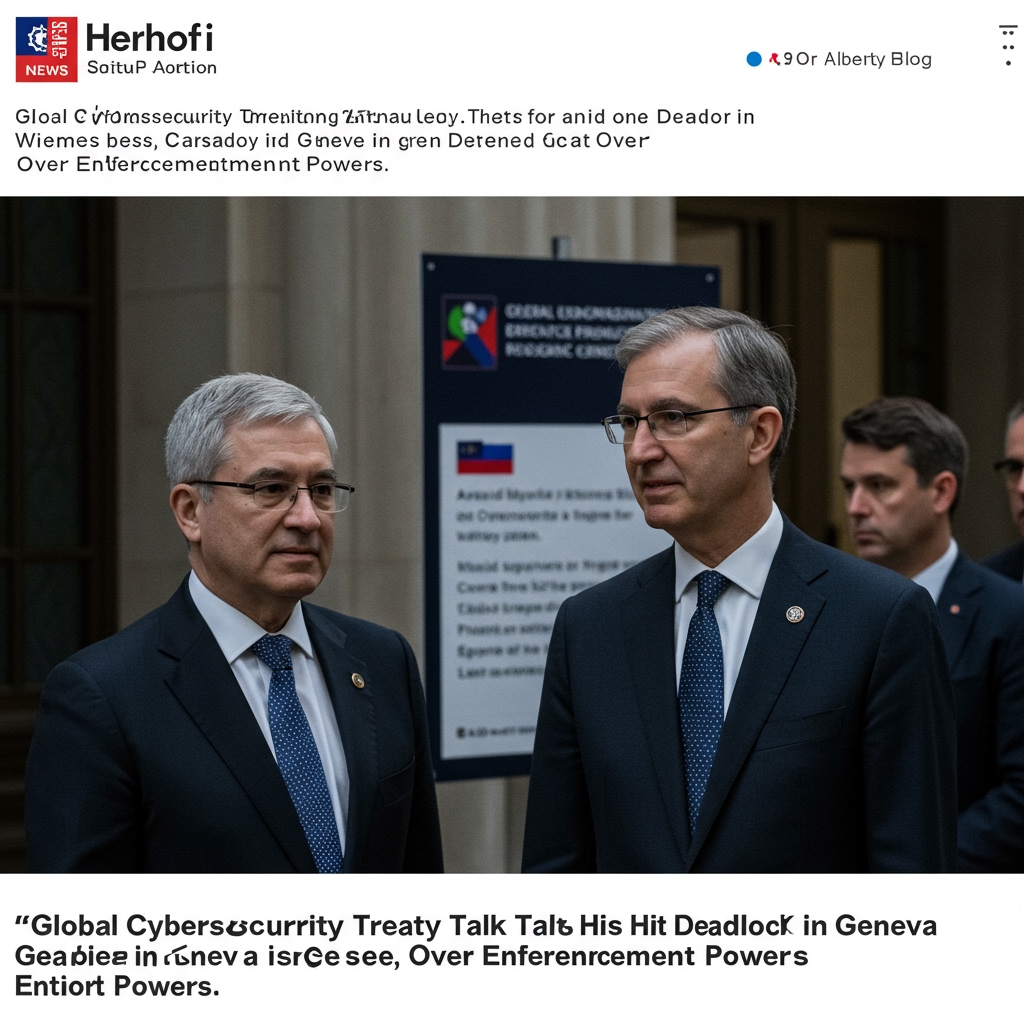Geneva Talks on Global Digital Security Accord Stall Over Key Enforcement Issues
Geneva, Switzerland — Negotiators representing over 100 nations converged in Geneva this week for what was designated as the penultimate round of discussions aimed at finalizing the text of the ambitious Global Digital Security Accord (GDSA). This critical treaty seeks to establish a universal framework for international cooperation on cybersecurity, addressing issues ranging from cybercrime and critical infrastructure protection to responsible state behavior in cyberspace.
However, the talks, which commenced with cautious optimism, encountered significant turbulence late Thursday, leading to a palpable stall in progress. The primary points of contention revolve around the proposed architecture for enforcing the treaty’s provisions: specifically, the authority of a planned independent oversight body and the intricate details of dispute resolution protocols. These issues lie at the heart of concerns over national sovereignty, accountability, and the practical implementation of international norms in the digital realm.
Divergent Views on Accountability and Cooperation
The disagreements highlight a fundamental divergence in philosophy among key global powers regarding how best to secure cyberspace. Delegates from the G7 nations have reportedly advocated for a robust oversight mechanism endowed with substantial authority, potentially including the ability to investigate breaches of the accord and recommend or even impose punitive measures against non-compliant states. This approach emphasizes accountability and deterrence, aiming to create a legally binding framework where violations have tangible consequences.
Conversely, the BRICS bloc, comprising major emerging economies, has argued for a different focus. Their position leans towards prioritizing cooperative capacity building, technical assistance, and information sharing among member states. This perspective suggests that fostering mutual capabilities and collaborative defenses is a more constructive path towards enhancing global digital security than a punitive enforcement regime that some fear could be politicized or unfairly applied. The BRICS argument underscores the varying levels of technological development and cybersecurity infrastructure across nations, suggesting that a one-size-fits-all punitive model might not be equitable or effective.
Sticking Points: Authority and Resolution
The specific issues causing the deadlock are multifaceted. Regarding the independent oversight body, questions persist about its composition, funding, transparency, and, crucially, the scope of its powers. Would it merely serve as a reporting or advisory body, or would it possess investigatory powers akin to international inspectorates? Would its findings be binding? Who would trigger an investigation, and under what criteria? These questions touch upon sensitive matters of national security and legal jurisdiction.
Similarly, devising universally acceptable dispute resolution protocols has proven challenging. Nations have differing legal systems and approaches to international law. Agreeing on a mechanism – be it arbitration, mediation, or referral to an existing international court – that is trusted by all parties and capable of effectively addressing complex cyber disputes is a formidable task. The potential for disputes arising from alleged state-sponsored cyberattacks or failures to prevent cybercrime originating from a state’s territory adds layers of complexity to this aspect of the negotiations.
Implications for the Global Digital Security Accord
The stall in Geneva raises concerns about the feasibility of meeting the ambitious timeline set for the GDSA’s finalization. A firm deadline of June 30, 2025, remains in place for agreeing upon the complete treaty text. Missing this deadline could jeopardize the planned ratification summit scheduled to take place in Singapore, a pivotal event intended to formally adopt the accord and mark a significant step towards its entry into force.
The GDSA is viewed by many as a critical opportunity to bring much-needed order and predictability to cyberspace, mitigating the risks of conflict and enhancing collective resilience against cyber threats that respect no borders. Failure to reach consensus on fundamental issues like enforcement could undermine the treaty’s effectiveness or even lead to its collapse, leaving the international community without a comprehensive, globally agreed-upon framework for digital security cooperation.
The Path Forward
Despite the current difficulties, negotiators expressed commitment to continuing the process. The coming months will be crucial for bridging the gaps that emerged this week. Diplomatic efforts are expected to intensify as nations seek compromises on the contentious issues of oversight authority and dispute resolution. The success of the final round of negotiations will heavily depend on the willingness of major blocs like the G7 and BRICS, along with other participating nations, to find common ground and prioritize the collective goal of a more secure and stable global digital environment over specific national or bloc interests.
The stakes are high. As cyber threats continue to evolve in sophistication and impact, a shared international framework like the GDSA is increasingly seen not just as desirable, but as essential. The outcome of these delicate negotiations in Geneva will have lasting implications for the future of cybersecurity governance worldwide.





